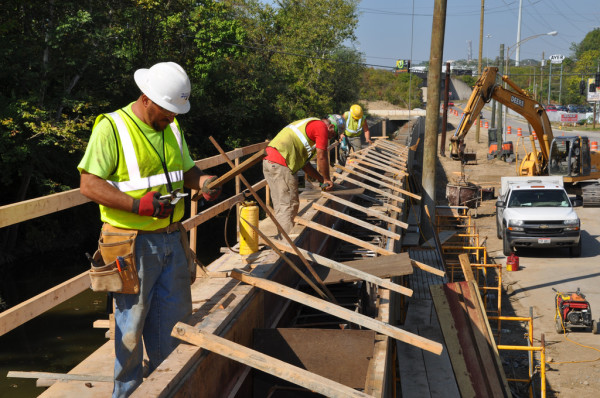How to Become a Licensed Carpenter
The Full Guide on How to Become a Licensed Carpenter
Image Source
As with every contractor license, there are certain requirements and steps that need to be fulfilled in order to become a licensed carpenter. License requirements might include prior experience, a training certificate, or even a surety bond.
All of these steps are usually present in one form or another in the states where carpenters are required to obtain a license, including Nevada, Arizona, Utah, California, and Oregon. Read on, for a comprehensive list of everything you need to know to become a licensed carpenter.
How to Become a Licensed Carpenter in a Nutshell
Becoming a licensed carpenter usually involves the following, which will be explored in-depth below:
- covering requirements for prior experience
- going through training and an examination (if applicable)
- submitting a contractor license bond
- getting relevant insurance (if applicable)
- submitting a license application and paying an application fee
- paying your license fee
A contractor or carpenter license may be obtained by individuals or by registered businesses such as partnerships, limited liability companies, or corporations.
Depending on the nature of your application and the state you are applying in, some of the above items may vary or be excluded altogether.
 Choosing Your Type of Carpenter License
Choosing Your Type of Carpenter License
Image Source
Before you apply for your license, your first step should be to check with your local State Board of Contractors whether there are different types of licenses for carpenters in the state.
Most states which require carpenters to get licensed usually only have one type of license for them. Some states, though, such as Arizona, feature a number of different carpenter licenses in their classification of contractor licenses.
This means that in the state of Arizona, for example, there is a carpentry license, a finish carpentry license, and a carpentry, remodeling and repairs license. While the procedure for applying for these licenses is the same, there may be differences in what the licenses permit you to do in terms of work.
Furthermore, the type of license you are applying for may also influence the amount of training hours and the types of training you have to pass successfully before you can become a licensed carpenter.
Experience Requirements for Carpenter Licenses
Another important factor when applying for your license is your prior experience. The usual experience requirement before one can apply for a contractor’s license is 4 years within the last 10 years. This is equal to journeyman-level experience.
Further experience taken into account that of a foreman, a supervising employee, or previous contractor experience. In most cases, experience claims must be verifiable. If you’ve already held a license in another state, this may help you qualify for a license elsewhere, and may even serve as a waiver for the usual trade examinations that need to be passed.
Education Requirements and Examinations for Carpenter Licenses
Most of the time, no prior education is required when applying for a carpenter license, apart from the education that is included in one’s former experience. However, most states that issue carpenter licenses require that applicants go through training at accredited training providers and subsequently take a test, as is the case in Oregon.
Other states, such as Nevada or Arizona, do not require applicants to go through training as long as they have the necessary experience. Applicants in these states only need to pass a business management (or business and law) test as well as, in the case of carpenters, a trade exam.
Due to the reciprocal agreements which Nevada, Arizona, Utah and California have, if you have passed a trade exam in one of these states, you may be eligible to apply in the other three without having to pass it again.
When contacting your State Board of Contractors, ask what the requirements are concerning training and examination, as well as when and how you can fulfill them. Here is an example of a carpenter license examination guide from the Contractors State License Board of California, to give you an idea what an examination may entail.
Getting the Appropriate Contractor License Bond
Many states which require carpenters to obtain a contractor license also require them to get a surety bond as part of that process.
Surety bonds are a form of agreement that extends financial guarantee to the bond’s obligees (consumers or the state) that they will be protected in the case of financial loss or damages. The bond’s principal (carpenters or contractors in this case) is the one who has to obtain the bond. Finally, the surety company is the one financially backing the bond.
Contractor license bonds guarantee that contractors will perform in accordance with state and industry regulations for their license. In this sense, they function like insurance – but for one’s clients or, more generally, for the public. For contractors, they serve as a line of credit that can be extended in the case of a claim against the bond.
Like all lines of credit, the surety bond has to be repaid if a surety needs to compensate a claimant. This last point is part of the indemnity agreement, which all sureties make with bond principals prior to underwriting their bond. This is why it is always best to avoid claims, and seek other ways of dealing with difficulties. Usually, your surety can help in this process, so it’s always good to communicate with them, early and often.
Not all states require that carpenters get bonded when they apply for their license. Some states, however, such as Arizona, California, Nevada, and Oregon, have regulations about surety bonds for carpenters.
License bonds have different can have different required amounts, which are regulated by state governments. A surety bond’s amount is the amount of its financial coverage. A surety bond premium is the cost that a principal has to pay to obtain that surety bond.
When you apply for a bond you will be offered a premium rate based on a percentage of the total bond amount. These rates are not fixed, they are determined on the basis of an applicant’s financial status – their credit score, financial statements, etc. A rate can therefore change over time, since surety bonds usually need to be renewed on an annual or bi-annual basis. Upon renewing your surety bond, you may get an even lower rate than previously if your financial status has improved.
Submitting Your Contractor License Application
In certain instances, prior to submitting your application, you may also be asked to obtain general liability insurance, and/or industrial insurance. That, along with the surety bond requirement, will depend on your state’s regulations.
When all of the above is covered, you’re ready to submit your application to your State Board of Contractors, along with paying the respective fees.
Here’s an example of a checklist and application forms for a contractor license from the state of Arizona. Similar checklists are found in most states which require carpenters to get licensed and bonded. Check your state’s Board of Contractors’ website before you get started, since it will likely contain plenty of useful resources.
Is there anything that you think should be added to this list? What’s your experience with getting licensed as a carpenter? Leave us a comment to join the conversation.
Todd Bryant is the president and founder of Bryant Surety Bonds. He is a surety bonds expert with years of experience in helping business owners get bonded and start their business.










